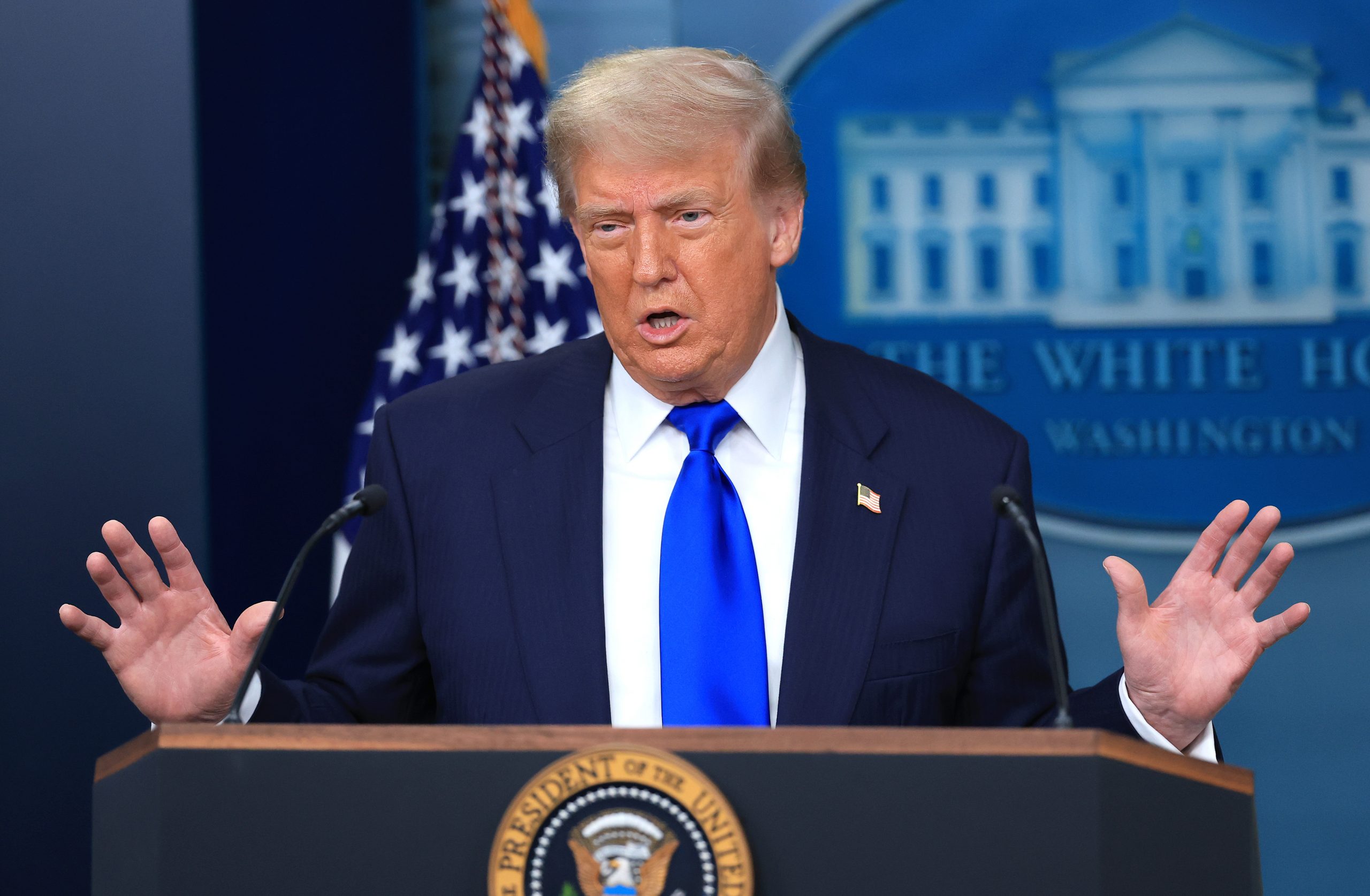President Donald Trump has spoken out after sparking criticism for using a term widely considered to be antisemitic during a speech. Addressing a crowd in Iowa on Thursday, Trump used the term “Shylock” when discussing his now-signed “Big, Beautiful Bill.”
When approached by a reporter on Friday about his use of the term that’s “widely viewed as an antisemitic” phrase, Trump was asked if he intended for the word “to be used in that way.”
“No, I’ve never heard it that way. To me, ‘Shylock’ is somebody that’s a moneylender at high rates. I’ve never heard it that way. You view it differently than me. I’ve never heard that,” he said, before opening up to other questions on the tarmac at Joint Base Andrews.
[time-brightcove not-tgx=”true”]
Trump had used the word when discussing taxes, telling an Iowa crowd: “No death tax, no estate tax, no going to the banks and borrowing some from, in some cases, a fine banker and in some cases Shylocks and bad people.”
Jewish advocacy groups came out to condemn the usage of the term, tracing its history back to the villain of William Shakespeare’s The Merchant of Venice, which sees the dubious character demand a pound of flesh from a Christian merchant unable to pay his debt. The play has long been regarded as antisemitic and problematic.
Read More: How Trump Fits Into the Long, Fraught History of the Relationship Between Israel and American Jews
“The term ‘Shylock’ evokes a centuries-old antisemitic trope about Jews and greed that is extremely offensive and dangerous. President Trump’s use of the term is very troubling and irresponsible,” said the Anti-Defamation League (ADL) in a statement posted on social media. “It underscores how lies and conspiracies about Jews remain deeply entrenched in our country.”
Former President Joe Biden used the term “Shylocks” in a speech in 2014 when he was Vice President, but said afterwards that it was a “poor choice of words.”
Trump’s use of the term comes at a precarious time, as instances of antisemitism and hate crimes towards Jewish Americans have surged in recent years, especially since the start of the Israel-Hamas war. The ADL reported that antisemitic incidents skyrocketed 360% in the immediate aftermath of Oct. 7, 2023. Furthermore, according to the State of Antisemitism in America 2024 report, published in February 2025, 33% of American Jews said they have been the personal target of antisemitism, in-person or virtually, at least once over the past year.
An attack in Boulder, Colorado, in June and the fatal shooting of two Israeli embassy employees in Washington, D.C., in May, are two recent incidents of anti-Jewish violence that have rocked communities in the U.S.
Read More: The Rise of Antisemitism and Political Violence in the U.S.
Meanwhile, the Jewish Council on Public Affairs spoke out on Friday against Trump’s “deeply dangerous” use of the term “Shylocks,” calling it “among the most quintessential antisemitic slurs in his remarks,” and claiming that the moment “follows years in which Trump has normalized antisemitic tropes and conspiracy theories.”
Jewish members of Congress have also come out to condemn the use of the term. Rep. Jerry Nadler of New York, a Democrat, described the history of the term, calling it “one of the most recognizable antisemitic slurs in the English language” that has “fueled discrimination, hatred, and violence against Jews.”
“I condemn Donald Trump’s dangerous use of this blatantly antisemitic slur and his long history of trafficking in antisemitic tropes,” Nadler said. “I have often said that if Donald Trump was serious about fighting antisemitism, he could start with the antisemites in his own Administration… If Donald Trump were serious about fighting antisemitism, he could start with himself.”
This is far from the first incident that has prompted concern in regards to Trump’s use of antisemitic tropes.
Trump previously appeared to indulge an antisemitic trope of Jewish people controlling things behind the scenes. In 2015, at an event with Jewish donors, he told the crowd, “I don’t want your money. You want to control your own politician.”
Prominent Jewish voices also raised concerns about Trump’s rhetoric in 2019, when he told reporters: “In my opinion, you vote for a Democrat, you’re being very disloyal to Jewish people, and you’re being very disloyal to Israel… and only weak people would say anything other than that.”
His comment came shortly after he had said: “I think any Jewish people that vote for a Democrat, I think it shows either a total lack of knowledge or great disloyalty.”
Jonathan Greenblatt of the ADL responded to Trump’s comments of “disloyalty,” saying the President had “made it clear he thinks Jews have a dual loyalty to Israel. This antisemitic trope has been used to persecute Jews for centuries and it’s unacceptable to promote it.”
In 2021, Trump revisited that line of rhetoric, saying in an interview that “people in this country that are Jewish no longer love Israel. I’ll tell you the evangelical Christians love Israel more than the Jews in this country.”

